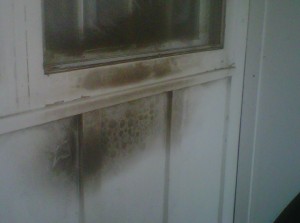With the warmer temperatures and plants in bloom, the season of grilling is upon us. Everybody, fire extinguishers at the ready! I have had a few run-in’s with a grill, and I’d like to help you avoid the many pitfalls of dealing with fire.
According to the government FEMA website, “the leading ignition factor is a result of some mechanical failure, such as a part failure, leak, or break and lack of maintenance (43%). Other leading ignition factors for outdoor grill fires include “operational deficiency” (primarily leaving the grill unattended), misuse of the material ignited (combustible material was too close to the heat), and misuse of the heat of ignition itself (inadequate control of the open fire and abandoned materials).”
That website also notes that the highest occurence of grill fires happens during the summer months. Wow. I wonder how many taxpayer dollars went to observe that obvious fact. In the spirit of observing the obvious, then, I offer my own thoughts on grill safety:
#1. Bigger is not better.
Making the heat higher or the flames bigger will not actually help things. A moderate temperature to get things going is more efficient, since if you make the grill too hot, you’ll just have to wait for it to cool down anyway. I once tried to make burgers for our Meal Co-op and ended up with burgers like hockey pucks. I also ended up with a very light wallet since I had to order pizza to feed them all when my original dinner plans went in the dumpster.
#2. Temperance is not always a virtue.
You gotta have some kind of heat or your poor lil’ burgers will stay raw. Sometimes when you want to slow cook something, like a brisket for example, you’ll want to keep the heat low but then cook it for a long time, not something you usually want to do with burgers or brats. I can’t tell you the number of times I have tried to go slow and low with the burgers only to run short on time and try to get them done by cranking up the heat. See #1 above.
#3. Men who stand around the grill are actually accomplishing something…
Namely not burning the food. I used to think about grilling like baking: you put the meat in there at a certain temperature, leave it for the alloted amount of time, and when you come back it is done. In grilling, you definitely need to monitor the situation. If that means the guys can have a beverage of choice and visit with pals while doing something that saves me the hassle of running in and out of the house, then I’m all for it.
#4. A grill is not a pot of water.
Often times I will put a pot of water on the stove, turn the flame up to high and go deal with other things for a while. This is a bad idea with a grill. Just as putting the lid on a pot will help the water boil quicker (maybe? I haven’t actually done the experiment needed to compare and contrast the boil rates, but it’s what I’ve always done), closing the lid on the grill will heat it up faster.
A lot faster.
So fast, in fact, that before you know it there’s billows of black smoke and char on your window.
And your paint blisters and changes from white to black with an edge of brown.
And you have to tell your husband that you sortof burnt the house.
And he takes away your grilling privileges for life.
Have you experienced a grill mishap? Please help me feel better about my serious and potentially dangerous blunder by sharing with me. Be safe, and enjoy all your perfectly cooked entrée items!



Leave a Reply